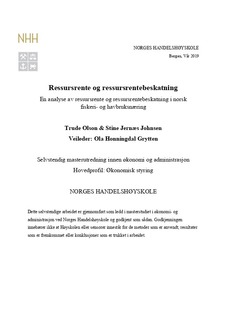| dc.description.abstract | This master thesis is about the resource rent and taxation of resource rent in Norwegian
fisheries and aquaculture. Increased profitability and higher level of concentration have
actualized the introduction of resource rent tax within the industry. This master thesis studies
the development in resource rent and relevant methods for resource rent taxation. A twofolded
research question is made to answer if there are a basis to implement resource rent tax
in Norwegian fisheries and aquaculture, and if so, what method and tax rate should be used.
The analysis in this report is based on data collected from the profitability survey by
Fiskeridirektoratet from 2009 to 2017.
The report starts by presenting the history and development of the industry. Then, relevant
theory, legal framework and previous research on the subject is reviewed to give support to
our calculations and findings in the analysis. The thesis has mainly used a quantitative
approach but is supplemented by a qualitative approach for a more nuanced and detailed
discussion.
Our results indicate, despite a substantial reduction in number of fishing vessels and
fishermen, that the structural development of the fishing fleet has not reached a level for a
resource rent taxation. The analysis shows that the fishing fleet does not realize a resource
rent at a level that forms the basis for special tax. The market fluctuations in this industry also
makes it difficult to determine which tax rate that should be introduced. In aquaculture,
however, we have observed both high profitability and realized resource rent. Nevertheless,
we do not find grounds for implementing special tax in aquaculture as they do not utilize a
scarce resource or carry out permanent interventions such as fisheries, and the hydropowerand
petroleum industry. Implementing resource rent taxation in the fisheries and aquaculture
could lead to adverse effects of distortion and negative effects on the coastal community. As
we see it today, resource rent taxation might appear to be a fiscal fraud to obtain government
revenue. | nb_NO |
